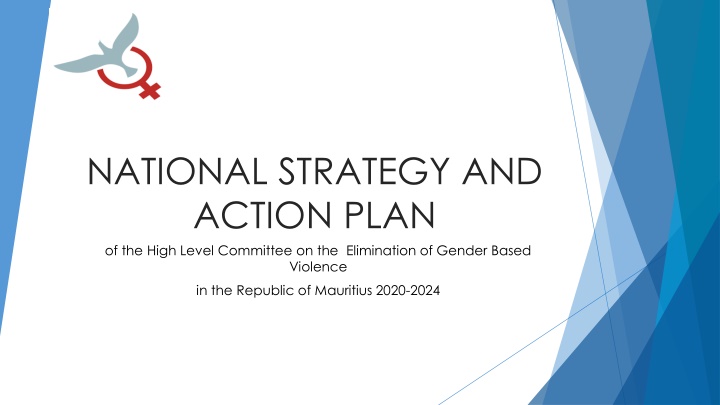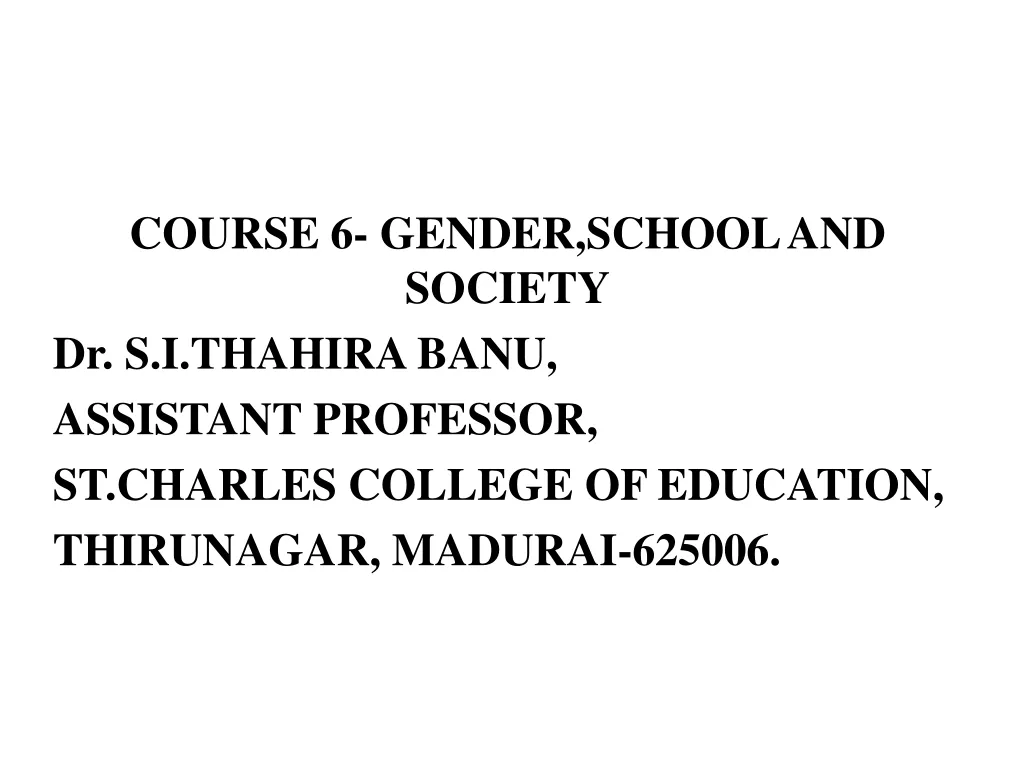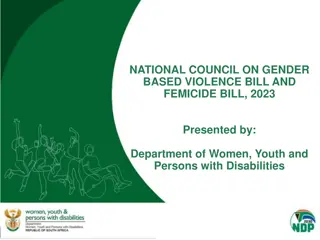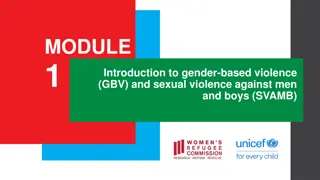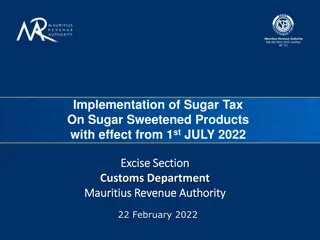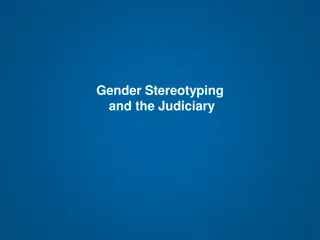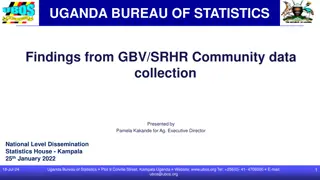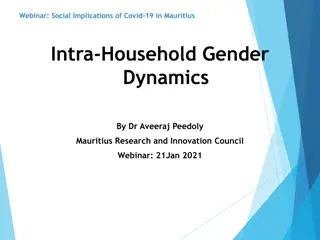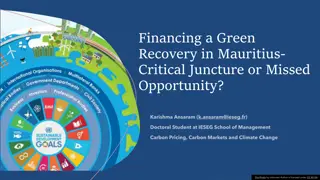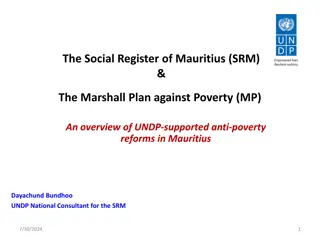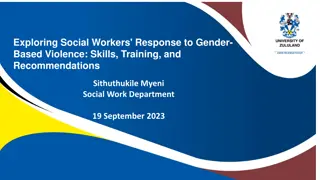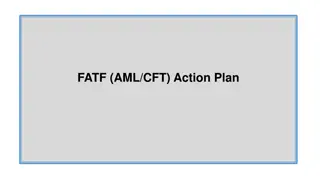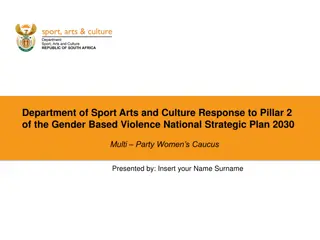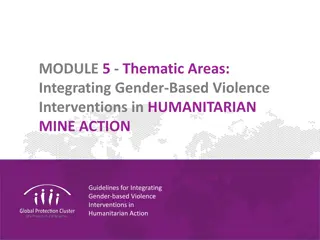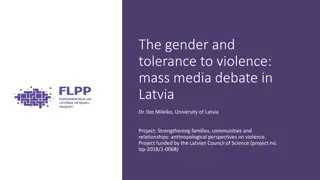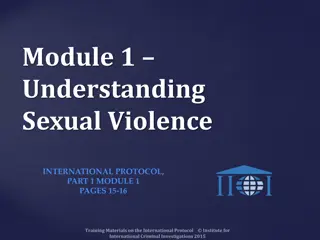National Strategy and Action Plan to Eliminate Gender-Based Violence in Mauritius 2020-2024
The National Strategy and Action Plan focuses on the elimination of Gender-Based Violence in Mauritius through 4 sub-strategies involving community engagement, leveraging technology, economic empowerment, and justice system reform. It also includes components like research, education campaigns, collaboration with religious leaders, and cost estimates for a comprehensive approach over 4 years.
Download Presentation

Please find below an Image/Link to download the presentation.
The content on the website is provided AS IS for your information and personal use only. It may not be sold, licensed, or shared on other websites without obtaining consent from the author.If you encounter any issues during the download, it is possible that the publisher has removed the file from their server.
You are allowed to download the files provided on this website for personal or commercial use, subject to the condition that they are used lawfully. All files are the property of their respective owners.
The content on the website is provided AS IS for your information and personal use only. It may not be sold, licensed, or shared on other websites without obtaining consent from the author.
E N D
Presentation Transcript
NATIONAL STRATEGY AND ACTION PLAN of the High Level Committee on the Elimination of Gender Based Violence in the Republic of Mauritius 2020-2024
National Strategy and Action Plan on Gender-based Violence(GBV) A High Level Committee (HLC) on the Elimination of Gender Based Violence, under the chairpersonship of the Honourable Prime Minister was established in January 2020 with a mandate of strategic national importance. The National Strategy and Action plan of the high Level committee on the Elimination of Gender Based violence in the Republic of Mauritius 2020-2024 was launched on the 25thNovember 2020.
4 Sub-Strategies In order to address the multifaceted aspects of GBV, 4 sub-strategies have been developed. These are:
Outputs Outputs 1: Outputs 2: (i) Engaged Community Leaders, Men and Boys and Inter-Faith Organisations as well as Government Stakeholders and Civil Society Organisations in their active role for prevention of GBV; Increased awareness around sexual and reproductive health and linkage to GBV; and (iii) Commitment of Media Houses for gender sensitive reporting on GBV. Outputs 3: (iv) Prioritised and Coordinated response by first responders and other stakeholders; (v) Leveraging on emerging technologies to address GBV; and (vi) Economic Empowerment of Survivors. (ii) Outputs 4: (vii) Formal Justice System more responsive to the needs of survivors; (viii) Enhanced capacity of stakeholders to respond to GBV cases; (ix) Revised Laws for increased gender sensitivity; and (x) Increased accountability of Perpetrators and Reduction in recidivism (xi) Improved Integration of stakeholder interventions; (xii) Strengthened Monitoring and Reporting; and (xiii) Equitable budgetary considerations to eliminate GBV
CLUSTERING OF 4 SUB-STRATEGY COMPONENTS Research and studies Data collection/recording system Information, education and sensitisation campaigns Collaboration with religious leaders Capacity building/training Policies/reports/action plan Projects Legislation
Cost Estimates of the National Strategy and Action Plan (4 years) SN Cluster by sub strategies Amount (Rs) Research and studies Data collection/recording system Information, education and sensitisation campaigns Collaboration with religious leaders Capacity building/training Policies/reports/action plan Projects Legislation Gross Total 1 23,400,000 2 5,000,000 3 25,500,000 4 5 3,000,000 24,050,000 6 7 8 6,000,000 44,300,000* 6,000,000 137,250,000
RESEARCH AND STUDIES Around 25 studies and surveys including action plans have been proposed in the National Strategy and Action Plan on GBV. Some examples are as follows: (1) Study on gendered belief systems to inform opportunities for improvement policies/programmes (Rs 700,000) There are gender stereotypes and beliefs leading men to exploit women emotionally and sexually. Therefore, the study will enhance opportunities policies/programmes. and girls physically, for improvement of
Research and Studies (Cont.) 2) Study on Religious Practices that Impede the Rights of Women and Girls (Rs 1 M) The proposed study will analyze perspective the religious beliefs and practices that impede women rights. It can be a tool to empower people in their struggles for gender equality and non-discrimination based on religious beliefs and practices. from a human rights 3) Gender-sensitive Content Analysis of the curriculum for the primary school level (Rs 400,000) In order to have sustainable impacts, the contents and methods of education have to be rendered gender-sensitive. In this respect, a gender-sensitive curriculum for the primary school level has to be undertaken. content analysis of the
Research and Studies (Cont.) 4) Impact Analysis Study of current programmes being implemented at the level of the Ministry of Gender Equality and Family Welfare (e.g. premarital counselling, Men as Partners, Mediation and Counselling for Perpetrators, etc.) (Rs 1.5 M) Some of the Programmes and projects implemented are as follows Men as Caring Partners (MACP), Pre-Marital Counselling and Marriage Relationship Programme, Strengthening Values for Family Life Programme. An impact analysis to be undertaken will enable the Ministry to reorient the current programmes. Enrichment Programmes, Inter-Generation 5) Feasibility study for the implementation of electronic monitoring of perpetrators ( e-bracelets) (Rs 500,000) In the pursuit of modernization of the criminal justice system, numerous governments around the world have been adopting the use of electronic monitoring bracelets as an alternative measure to imprisonment. Research and study makes it possible to analyze the possibilities and limitations of its use, in order to identify whether this type of electronic surveillance is also advisable for countries like Mauritius.
DATA COLLECTION/RECORDING SYSTEM To develop a GBV statistical Framework for Mauritius (Year Target 2021) Cost Estimates: Rs 5 M Currently statistics on victims of GBV are kept at different and separate levels, namely at the Ministry of Gender Equality and Family Welfare, at the Police, with the Ministry of Health and Wellness and sometimes with NGOs. It is important that a holistic system be designed to capture realistic and updated statistics on cases of gender based violence, that can guide policy making. In this respect, technical expertise will be required to undertake: (i) statistical capacity development for GBV analysis and (ii) strengthen national capacity to collect, analyse and disseminate statistics on GBV to significantly increase institutional understanding and encourage systemic production of official statistics on GBV as well as related indicators at national level, including in Rodrigues.
INFORMATION, EDUCATION AND COMMUNICATION (IEC) CAMPAIGNS Awareness Raising Campaigns provide an opportunity to all stakeholders to consolidate exiting structures and start afresh and explore new and innovative avenues and approaches to ensure effective realization of the Government vision to eliminate GBV. The Campaigns are intended to enable all stakeholders such as individuals, groups, organizations, and communities, play active roles through the adoption of a holistic approach of knowledge sharing and capacity building to address GBV. awareness creation, For example Conduct aggressive sensitization campaigns using media avenues on gender equality; Deliver Awareness Programmes for Teenage Mothers on their S&RH rights; and Organise Dialogue Forums at community levels for different age groups of women and men to discuss constructs of masculinities and related implications on gendered identities and effects on equal opportunities and access in all areas Estimated Cost Rs 25.5 M
COLLABORATION WITH RELIGIOUS LEADERS Faith-based organisations hold influential power in constructing social roles, thus partnerships are critical across different religious bodies, especially in a multi- ethnic and multi-cultural context. Hence there is a need for Engagement and Capacity enhancement of religious leaders in the shared understanding of GBV and implications for communities and establishing faith-based groups with religious leaders to address GBV Cost Estimates: Rs 3,000,000
CAPACITY BUILDING/TRAINING Training of legal practitioners on gender concepts for gender sensitivity in legal documents Conduct training and refresher programmes for all media houses; Training Programme with Magistrates and Lawyers Bring expertise as a multidisciplinary team to provide training to all institutions Estimated Cost Rs 24,050,000 Rationale: GBV is rooted Concurrently, it has been assessed that there is limited technical capacity to conduct sectoral gender mainstreaming in policies and programmes; and to train different target groups on GBV. Thus, capacity building and approaches will remain important to sustain efforts within different sectors to eliminate GBV. in unequal power relations. implementing innovative
Policies/Reports/Action Plan Estimated Cost - Rs 6 M Rationale: There is a need to produce policies, reports and action plans on a number of areas to tackle the scourge of GBV. The laws, policies and practices that undermine efforts to achieve gender equality are targeted in sub- strategy 3. Examples of redressing discriminatory practices include: 1) Changing laws and criminal justice processes that enable perpetrators to continue to commit violence and abuse with relative impunity; 2) Amending policies to include gender-sensitive language; 3) Coordinated mechanisms to identify discriminatory practices; and 4) Building capacity of stakeholders to identify and take steps to redress discriminatory practices
PROJECTS The Strategy document provides for the implementation of a number of projects targeting the broad spectrum of stakeholders involved in elimination of Gender Based Violence. It recommends the setting up of small grants programmes, including loan disbursement institutions to provide funds for women s empowerment and gender equality programmes. There are also recommended actions to: 1. Develop and deliver In-Service Training of Trainers training package for medical staff (public and private), and Police Force; 2. Develop protocol for referral to Police Family Protection Unit; 3. Formulation of an accredited economic empowerment programme for Survivors of GBV; and 4. Establish an operational GBV Observatory as an autonomous entity. There is a need to provide special funds for implementation of projects by NGOs and CBOs to address GBV. Cost Estimates: Rs 44.3 M
LEGISLATION The National Strategy contains elements to review, and where possible, amend policies and laws to be more gender responsive, hold perpetrators accountable and help communities progress towards gender equality. Evidence-based practice further suggests that institutional and operational changes in responding to matters of GBV will improve survivor outcomes. Improved levels of collaboration and coordination amongst stakeholders remains key to adopting holistic and integrated policies/laws as well as having strong institutions for survivor focused interventions. There are recommended actions to address the following: 1. Amendment to the Protection from Domestic Violence Act; 2. Strengthen national legal framework to protect survivors (including indirect) in compliance with international standards and Conventions; 3. Amendment to the Constitution(S 3, 16, 75) and Equal Opportunities Act (S 2, 5-7) for a comprehensive definition of discrimination against women and pardon granted to convicted perpetrators of GBV against women; 4. Hold consultations with key stakeholders for gender to be mainstreamed in any forthcoming Disabilities Bill
